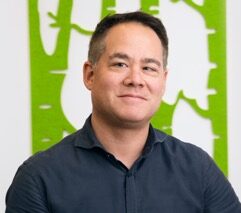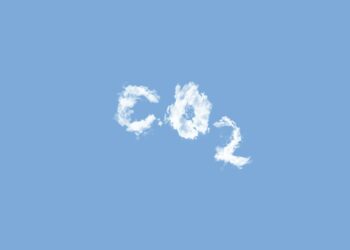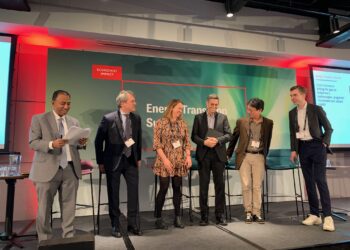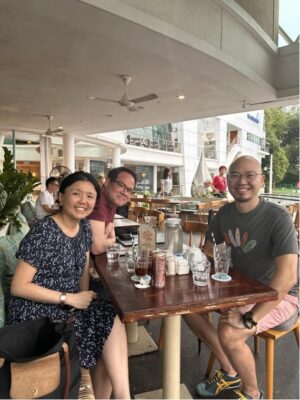
Woon Hui Oh, Chris Gruen, Gerald Foo
“Climate change is like the gradual boiling of a frog,” remarked Gerald Foo, a former colleague from Shell, as Woon-Hui Oh and I sat sweating in the heat of Singapore, sipping on cold drinks to find solace from the relentless 30-degree Celsius temperatures and 80% humidity (Having traversed the urban tropics of Malaysia, Singapore, and the Philippines over the years, I’ve learned that there are only two states of being: Outside, where you’re drenched in sweat, or Inside, where you’re battling the chill of artificial winter.).
Gerald’s analogy struck a chord: if climate change were to unleash its havoc all at once, humanity would react with urgency, akin to a frog leaping out of boiling water. However, its slow, insidious advance often escapes our notice, much like a frog simmering unaware in a pot until it’s too late.
Indeed, the majority of the global population remains entrenched in denial or bargaining phases regarding climate change. But how does Asia, particularly Singapore, fare in comparison to Europe on the journey towards Net Zero?
.
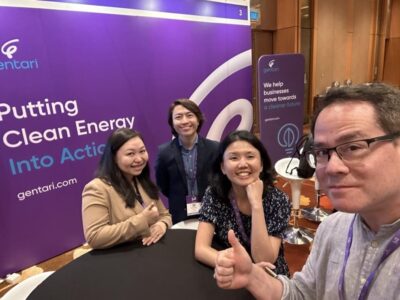
At the Gentari stand at the ATO Zero in Singapore
Having immersed myself in Singapore’s ecosperity week, attending various sessions including ATOZero and reconnecting with old and new acquaintances, I couldn’t help but draw parallels between Asia’s current stance and where Europe stood roughly seven years ago when I co-founded NovAzure.
Initially underwhelmed by the modest turnout at some events, Woon-Hui Oh and I soon realised that quality trumped quantity. As Woon-Hui eloquently captured in her article (Net Zero Conversations in the Garden City), the plethora of expert speakers offered invaluable insights into diverse decarbonisation methods, painting a vivid picture of the opportunities awaiting Asia.
Yet, despite this wealth of knowledge, why does Asia still seem to lag in the Net Zero journey? Several factors come to mind:
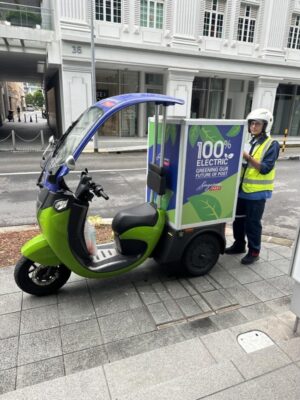
Last mile deliveries in Singapore embrace new electric vehicle classes too.
Industrialisation and Development:
Many Asian nations are still in the throes of industrialisation and economic growth, heavily reliant on fossil fuels, thus driving up emissions.
Population and Urbanisation:
Asia’s burgeoning population, coupled with rapid urbanisation, poses a challenge in meeting energy demands while transitioning to cleaner sources.
Infrastructure:
Outdated or inadequate infrastructure impedes the swift adoption of renewable energy, necessitating significant investments and time.
Political and Socioeconomic Factors:
Political inertia, policy gaps, and socioeconomic priorities may hinder progress towards Net Zero in some Asian countries.
.
On the corporate front, while European firms face mounting pressure to meet GHG emission targets, Asian regulators still need to tighten their grip significantly. Similarly, on the consumer side, burgeoning middle classes prioritise convenience and consumption over costly green initiatives, reflecting prevailing socioeconomic norms. You can’t blame them, we would all react in the same way.
However, Asia’s strides in certain areas of the Net Zero agenda are undeniable. China’s dominance in electrification, exemplified by soaring EV sales, outpaces European counterparts. Despite Asia’s vast diversity, this lag behind Europe by what I feel is roughly five to seven years paradoxically instills confidence in the progress made here in Europe.
Herein lies the opportunity: leveraging cross-market learnings to propel Asia forward. Singapore, with its strategic positioning, is exposed to this potential. From Sembcorp Industries’ transition to green energy to Temasek’s visionary investments, Singapore leads by example, underscoring a long-term commitment to sustainability rather than thinking about a short term legislative period.
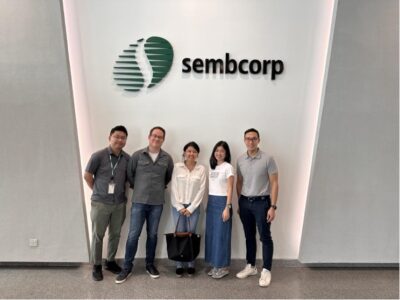
Chun How Oh, Christopher Gruen, Woon Hui Oh, Sheau Yun Lai and Kin Wong
Moreover, Singapore’s role as an international hub amplifies its influence. The exponential growth of its port, shared over a Kopi C session with Oliver Risse of HHLA Next, underscores its pivotal position in global trade. This, in turn, catalyses the decarbonisation agenda, as international businesses are starting to tackle their scope 3 GHG emissions to stay competitive – which includes making their entire supply chain – including logistics – green.
To explore how your company can harness Net Zero as a value driver on the global stage, reach out to me, Christopher Gruen, at c.gruen@novazure.com. At NovAzure, we possess extensive expertise in decarbonisation, offering tailored solutions to navigate this transformative journey. From leadership training to strategic partnerships, we’re here to empower you to seize the opportunities of a greener, more sustainable future.

